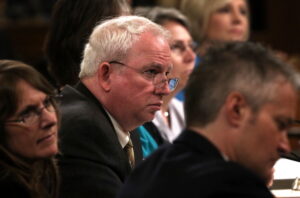
(Photo by Alex Wong/Getty Images)
John Eastman swings for the fences. Whether he’s plotting an electoral coup, or trying to hide evidence of it from the January 6 Select Committee, Donald Trump’s erstwhile attorney is all in.
And so it is perhaps unsurprising that, Eastman refused to simply accept US District Judge David O. Carter’s order to disclose 159 disputed emails in the custody of his former employer Chapman University to the committee investigating the Capitol Riot.

How LexisNexis State Net Uses Gen AI To Tame Gov’t Data
Its new features transform how you can track and analyze the more than 200,000 bills, regulations, and other measures set to be introduced this year.
“As he reviews materials for disclosure, Dr. Eastman has encountered several discrepancies in the Court’s order addressing the documents he must disclose,” his lawyer Charles Burnham argued Friday night, after securing a five-day extension of the time to redact several of the emails as per the court’s prior order. “Dr. Eastman seeks correction or clarification of several issues so that he may fully comply with the Court’s decision. In the alternative, Dr. Eastman asks the Court to allow redaction of the names of experts and agents whom he engaged with in emails that he must now produce.”
The so-called Motion for Clerical Mistakes; Oversights and Omissions went on to wonder if His Honor really meant it when he said that a handwritten note from Trump bragging about is crowd size was subject neither to work product nor attorney-client privilege. Possibly the judge would like to reconsider his position that communications with Georgia legislators must be disclosed. Perhaps the court had “mistakenly determined that some documents were communications with legislators” and would like to “correct this erroneous characterization.” And while Judge Carter is at it, Eastman suggests that he might also revisit the issue of statistical analyses and decide that they constitute work product after all.
Turns out, not so much.
While conceding that he had indeed meant to refer to document 23550 instead of 23450, Judge Carter did not agree with Eastman’s invitation to revisit the rest of his prior holding under the guise of “correcting clerical errors.”

Transform Legal Reasoning Into Business-Ready Results With General AI
Protégé™ General AI is fundamentally changing how legal professionals use AI in their everyday practice.
“The remainder of Dr. Eastman’s claims are not clerical errors or requests for clarification but disagreements with the Court’s legal conclusions. Dr. Eastman’s arguments are masked requests for reconsideration under Rule 60(b), which is only applicable in exceptional circumstances,” he wrote, adding that “[n]one of Dr. Eastman’s other arguments are valid bases for reconsideration,” and denying a novel request to redact the names of statisticians and correspondents because “[a]rguments not raised by a party in its opening brief are deemed waived.” Womp womp.
Meanwhile, John Eastman’s name is back in the news after Politico published a legal memo from former Vice President Mike Pence’s top lawyer Greg Jacob demolishing the reasoning in Eastman’s infamous Coups 4 Dummies memo.
Jacob pointed out that Eastman’s plan originally relied on Republican-dominated state legislatures reconvening to claw back electoral votes and certify “alternative” slates of electors as a condition precedent for Pence rejecting swing state electors for Biden on January 6. When that didn’t happen, Eastman recommended that Pence either unilaterally reject the electoral votes, or that he suspend the certification process to allow ten days to investigate non-existent electoral fraud.
As Eastman himself acknowledged, this would violated the Electoral Count Act in multiple ways, not least because it would short-circuit the statutory process for members of Congress to object to electoral slates. And the gambit would almost certainly be dead on arrival in court.
As Judge Carter observed when he denied Eastman’s claims of work product privilege over the Pence plot, Eastman himself acknowledged it had “a near-zero chance of success” in courts. In fact, Eastman counseled Trump to stay as far away from the courts as possible rather than risk an adverse ruling which would “tank the January 6 strategy” by pointing out that what they were proposing was blatantly illegal.
“In a best-case scenario in which the courts refused to get involved, the Vice President would likely find himself in an isolated standoff against both houses of Congress, as well as most or all of the applicable State legislatures, with no neutral arbiter available to break the impasse.
Safe bet that Jacob will have a lot to say about Eastman’s plan when he testifies publicly before the committee on Thursday. And by then, Eastman’s buddies Liz Cheney and Bennie Thompson should have all the disputed emails, since Judge Carter ordered them disclosed by 3pm ET today.
Congrats, Professor, you really stuck the landing! Again.
Pence-world’s final takedown of Trump’s Jan. 6 bid to remain in power revealed in his lawyer’s memo [Politico]
Eastman v. Thompson [Docket via Court Listener]
Liz Dye lives in Baltimore where she writes about law and politics.